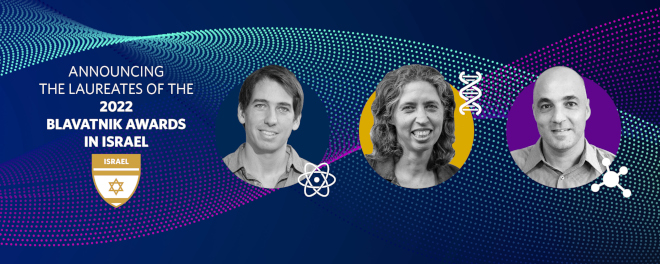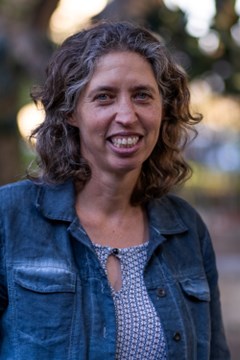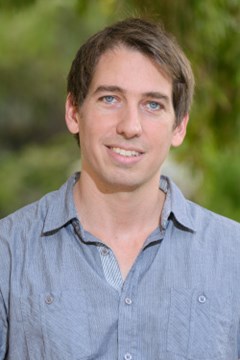
Jerusalem, February 8, 2022 – The Blavatnik Family Foundation, the New York Academy of Sciences, and the Israel Academy of Sciences and Humanities announced today the Laureates of the 2022 Blavatnik Awards for Young Scientists in Israel. This year’s Laureates, who will each receive US$100,000, are:
- Noam Stern-Ginossar, PhD (Life Sciences) – Weizmann Institute of Science – Recognized for developing groundbreaking analytical tools to study viral gene regulation in cytomegalovirus. These tools include the use of ribosome profiling to generate high resolution maps of the genome, and have also been applied to characterize the genome of SARS-CoV-2, the virus that causes COVID-19.
- Menny Shalom, PhD (Chemistry) – Ben-Gurion University of the Negev – Recognized for the development of new types of advanced materials for alternative energy sources. These low-cost materials are stable under harsh conditions and can be utilized in the development of solar cells, batteries, and fuel cells.
- Ronen Eldan, PhD (Physical Sciences & Engineering) – Weizmann Institute of Science – Recognized for groundbreaking contributions to high-dimensional probability, a mathematical subject that deals with datasets with a very large number of variables. He has solved long-standing, open conjectures in this area, and has developed techniques that have found wide applications across the fields of statistics and computer science.
The Blavatnik Awards recognize exceptional scientists at the early stages of their careers for their achievements and their demonstrated potential for future discoveries. The prizes are awarded to researchers aged 42 and younger for groundbreaking work in the disciplines of Life Sciences, Chemistry, and Physical Sciences & Engineering. The Blavatnik Awards in Israel parallel their international counterparts, the Blavatnik National Awards and Blavatnik Regional Awards in the United States, and the Blavatnik Awards in the United Kingdom.
The 2022 Blavatnik Awards for Young Scientists in Israel will be conferred at a ceremony to be held at the Peres Center for Peace & Innovation in Tel Aviv-Jaffa on June 8, 2022. The Laureates will join a cadre of young scientists from across Israel who have been honored by the Blavatnik Awards in Israel since the launch of the Awards in 2017. In addition, the Laureates will become part of the international Blavatnik Science Scholars community, which, by the close of 2022, will total over 400 young scientists from around the world. Each summer the Laureates are invited to attend the annual Blavatnik Science Symposium in New York City hosted by the New York Academy of Sciences, where past and present Blavatnik Awards honorees from around the world come together to share new ideas and forge collaborations for novel, cross-disciplinary research.
“Israel's remarkable science is led by brilliant young men and women who push boundaries with discoveries that improve lives and expand knowledge,” said Len Blavatnik, Founder and Chairman of Access Industries and Head of the Blavatnik Family Foundation. “We honor these three outstanding, innovative scientists for their significant contributions and look forward to their future work and discoveries in the years to come.”
Nicholas B. Dirks, President and CEO of the New York Academy of Sciences, said, “Israel has a long history of investing in academic science. As a result, Israel is now a thriving global center of scientific research and technological innovation. We are proud to administer the Blavatnik Awards in its fifth year in Israel with our partner, the Israel Academy of Sciences and Humanities, and to recognize this year’s exceptional young Blavatnik Awards in Israel Laureates, including the first Laureate from Ben-Gurion University of the Negev.”
Professor David Harel, President of The Israel Academy of Sciences and Humanities, said, “In this challenging pandemic period, we take pride in continuing our collaboration with the Blavatnik Family Foundation and the New York Academy of Sciences to maintain the tradition of bestowing these distinguished awards upon outstanding Israeli scientists. We are confident that the present massive investment will yield significant benefits for the international scientific community and will inspire future generations of scientists to follow in the footsteps of this year’s Laureates, by leading humanity to further magnificent breakthroughs.”
During the nomination period for the 2022 Blavatnik Awards for Young Scientists in Israel, 37 nominations were received from seven universities across the country. Members of the Awards’ Scientific Advisory Council, which includes Nobel Laureates, Professors Aaron Ciechanover and David Gross and Professor Sir Richard Roberts, along with Chairman of the Israel Space Agency and Chairman of the National Council for R&D for the Ministry of Science and Technology of Israel, Professor Isaac Ben-Israel, were also invited to submit nominations. Three distinguished juries composed of leading scientists representing the three disciplinary categories and led by Israel Academy members, selected the 2022 Laureates.
About the Laureates
LIFE SCIENCES:

Noam Stern-Ginossar, PhD
Associate Professor of Microbiology, Weizmann Institute of Science
Dr. Noam Stern-Ginossar has developed revolutionary strategies to decode the viral genome of human cytomegalovirus (CMV). She revealed how it is reactivated after periods of dormancy in the body, and discovered basic principles of virus-host interactions. CMV, a herpesvirus, infects the majority of the world's population and can lead to severe diseases in newborns and immunocompromised adults. In order to characterize CMV’s genome, Stern-Ginossar applied a technique based on deep sequencing, wherein she sampled a specific piece of the host machinery used for viral reproduction—the ribosome—to identify fragments of viral genome (RNA). Results from these sequencing experiments reveal which proteins are encoded from the RNA and how the virus affect the host cells. This method, termed “ribosome profiling”, has been used to reveal hundreds of previously undiscovered, virus-produced proteins that can regulate the production of proteins in the host cell. In 2020, Stern-Ginossar applied this technology to rapidly characterize the coding capacity of the SARS-CoV-2 genome.
Menny Shalom, PhD
Professor of Inorganic & Solid-State Chemistry, Ben-Gurion University of the Negev
There are a variety of ways to approach the problem of renewable and sustainable energy production. Major advances in materials synthesis and manufacturing techniques, as well as the sheer need for more energy worldwide, have brought about a rapid increase in the study of solar energy conversion into fuel, through the development of materials which are capable of capturing, storing, and releasing energy from sunlight. Menny Shalom, PhD, approaches this difficult problem through the rational design of novel, inexpensive, easily synthesized, and chemically stable materials that contain only the elements carbon, nitrogen, phosphorus, sulfur, and boron. Materials developed by Shalom have found uses in a variety of applications including photoelectrochemical water splitting to hydrogen and oxygen, batteries, and photocatalysts—tiny particles that speed up chemical reactions when exposed to light. Through careful analysis of the mechanisms by which these materials are made and their resulting behavior, this work will have a significant impact on renewable and sustainable energy production.
PHYSICAL SCIENCES & ENGINEERING:

Ronen Eldan, PhD
Associate Professor, Department of Mathematics, Weizmann Institute of Science
The work of Professor Ronen Eldan has led to breakthroughs in solving conjectures in the mathematical theory of high-dimensional phenomena that have profound impacts on the fields of statistics, machine learning, and theoretical computer science. His research spans several fields of mathematics, with a focus on high dimensional probability, which concerns the study of random systems with many variables or many sources of randomness. One of his main contributions is the development of a new methodology which builds on an unexpected connection between the analysis of high-dimensional systems and stochastic calculus, the theory which studies the motion of diffusing particles. Moreover, his applied line of research has led to new understanding of the limitations of neural networks in machine learning and a new algorithm for decision-making in artificial intelligence. Prof. Eldan is currently on sabbatical as the von Neumann Fellow in the School of Mathematics at the Institute for Advanced Study.
About the Blavatnik Awards for Young Scientists
The Blavatnik Awards for Young Scientists, established by the Blavatnik Family Foundation in 2007 and independently administered by the New York Academy of Sciences, began by identifying outstanding scientific talent in New York, New Jersey, and Connecticut. In 2014, the Blavatnik National Awards was created to recognize faculty-rank scientists throughout the United States. In 2017, the Awards were further expanded to honor faculty-rank scientists in the United Kingdom and Israel. By the end of 2022, the Blavatnik Awards will have awarded prizes totaling US$13.6 million. Over the years, award recipients have hailed from 48 countries across six continents (with nearly 60 percent of all recipients immigrants to the country in which they are recognized), reflecting the Blavatnik Family Foundation’s recognition that important science is a global enterprise. For updates about the Blavatnik Awards for Young Scientists, please visit http://www.blavatnikawards.org or follow us on Twitter and Facebook @BlavatnikAwards.
About the Blavatnik Family Foundation
The Blavatnik Family Foundation is an active supporter of world-renowned educational, scientific, cultural, and charitable institutions in the United States, the United Kingdom, Israel, and throughout the world. The Foundation is headed by Len Blavatnik, a global industrialist and philanthropist and the Founder and Chairman of Access Industries, a privately-held industrial group based in the US with global strategic interests in natural resources and chemicals, media and telecommunications, real estate, venture capital/technology, entertainment, and biotechnology.
For more detailed information, please visit: www.accessindustries.com or www.blavatnikfoundation.org.
About the New York Academy of Sciences
The New York Academy of Sciences is an independent, not-for-profit organization that since 1817 has been committed to advancing science for the benefit of society. With more than 20,000 Members in 100 countries, the Academy advances scientific and technical knowledge, addresses global challenges with science-based solutions, and sponsors a wide variety of educational initiatives at all levels for STEM and STEM-related fields. The Academy hosts programs and publishes content in the life and physical sciences, the social sciences, nutrition, artificial intelligence, computer science, and sustainability. The Academy also provides professional and educational resources for researchers across all phases of their careers. Please visit us online at www.nyas.org.
About The Israel Academy of Sciences and Humanities
The Israel Academy of Sciences and Humanities is Israel’s flagship scientific institution. It was established by law in 1961 and acts as a national focal point for Israeli scholarship in all branches of the sciences, social sciences, and humanities. The Academy’s membership comprises 135 of Israel’s most distinguished scientists and scholars in its two sections―the Sciences Section and the Humanities Section. It is tasked with promoting Israeli scientific excellence, advising the government on scientific matters of national interest, publishing scholarly research of lasting merit, and maintaining active contact with the broader international scientific and scholarly community. For more information about The Israel Academy of Sciences and Humanities, please visit: www.academy.ac.il.
